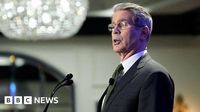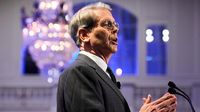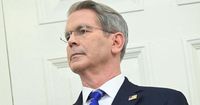In a significant address on April 23, 2025, U.S. Treasury Secretary Scott Bessent expressed a strong desire for a "big deal" in trade between the United States and China, emphasizing that the current economic tensions could ease with the right changes in both countries’ policies. Speaking at the Institute of International Finance in Washington, Bessent highlighted the need for China to move away from its reliance on export-led manufacturing, a shift he believes is essential for both nations' economic health.
"China needs to change. The country knows it needs to change. Everyone knows it needs to change. And we want to help it change because we need rebalancing too," Bessent stated, underscoring the urgency of fostering a more balanced global trade environment. His comments come amid escalating tariffs that have characterized the trade war between the two largest economies in the world, with the U.S. imposing tariffs of up to 145% on Chinese goods, while China retaliated with a 125% tax on U.S. products.
Despite the harsh realities of the ongoing economic conflict, Bessent's remarks offered a glimmer of hope for a resolution. He asserted that it is a "matter of impetus and will" to reach an agreement that would benefit both countries. "If China is serious about less dependence on export-led manufacturing growth, and a rebalancing towards a domestic economy… if they want to rebalance, let's do it together," he said, framing the potential negotiations as an incredible opportunity.
President Donald Trump has also indicated a willingness to reconsider the current tariff structure, suggesting that the tariffs on Chinese imports could "come down substantially, but it won't be zero." This statement has raised expectations among investors, leading to a notable surge in stock prices on the day of Bessent's speech, as hopes for a de-escalation of trade tensions grew.
However, Bessent cautioned that the U.S. would not make unilateral concessions to China regarding tariffs. "There will be no unilateral reduction in tariffs against China," White House Press Secretary Karoline Leavitt affirmed shortly after Bessent's address, reiterating that any discussions would require China to engage seriously in negotiations.
In addition to trade relations, Bessent took the opportunity to criticize the International Monetary Fund (IMF) and the World Bank for straying from their core missions. He argued that both institutions have devoted too much time and resources to what he called "vanity projects" like climate change and gender issues, which he believes distract from their primary goals of promoting economic stability and growth.
"These issues are not the IMF's mission," Bessent stated, reflecting a sentiment echoed by many in the Trump administration who advocate for a return to a more focused approach in international financial institutions. He further asserted that the IMF "has no obligation to lend to countries that fail to implement reforms," pushing for a reevaluation of how these institutions operate.
Bessent's comments have been met with mixed reactions. While some analysts and bankers welcomed his call for reform, viewing it as a necessary step for the IMF and World Bank to regain their effectiveness, others worry about the implications of such a shift. Bank of England Governor Andrew Bailey expressed optimism about Bessent's stance, stating he was "very frankly encouraged" by the remarks.
As the world watches the unfolding trade saga, Bessent's vision for a collaborative approach with China stands out as a potential pathway to stability. He believes that if both nations can commit to rebalancing their economic strategies—where the U.S. boosts manufacturing and China increases domestic consumption—there exists a real chance for a mutually beneficial agreement.
Yet, the path forward remains fraught with challenges. Bessent noted that while the Trump administration is eager to work with the IMF and World Bank, it is equally committed to ensuring these institutions do not deviate from their essential functions. He stated, "The Trump administration will leverage U.S. leadership and influence at these institutions and push them to accomplish their important mandates." This insistence on reform reflects a broader strategy of the administration to reshape global economic governance in a way that aligns with its priorities.
In conclusion, the prospect of a "big deal" between the U.S. and China on trade is contingent not only on the willingness of both sides to negotiate but also on the ability of international institutions like the IMF and World Bank to adapt to the changing economic landscape. As Bessent aptly put it, "This is an incredible opportunity," one that could redefine global trade relations for years to come.






